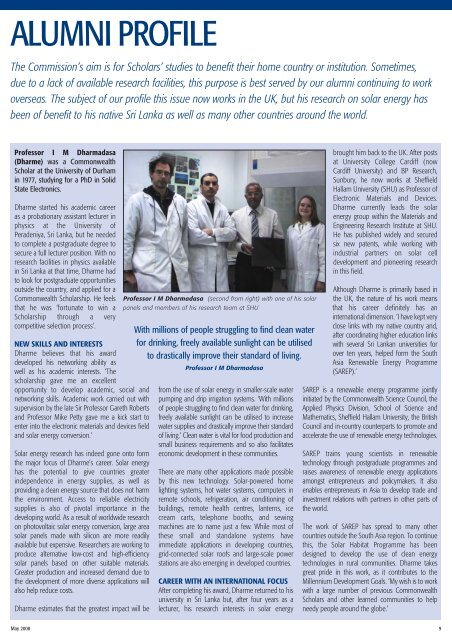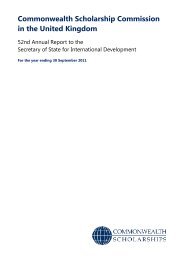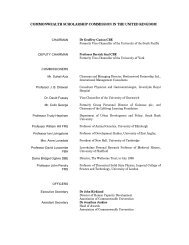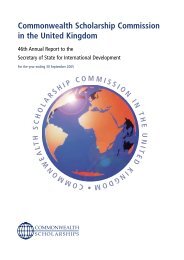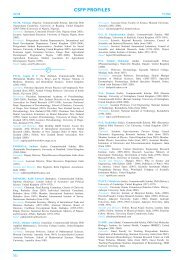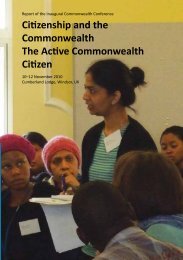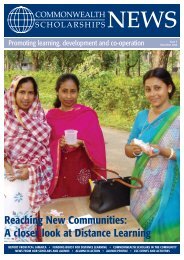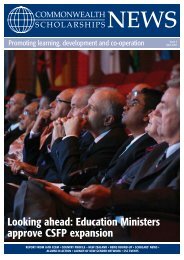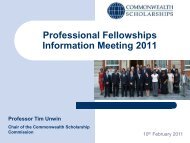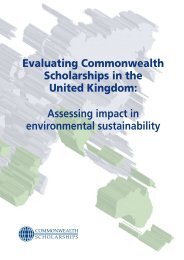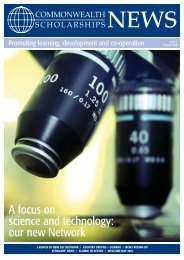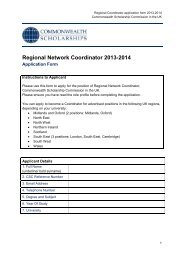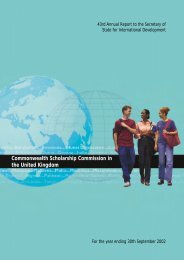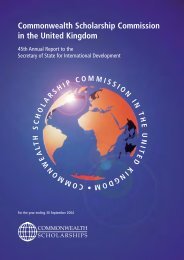Issue 6 - Commonwealth Scholarship Commission in the United ...
Issue 6 - Commonwealth Scholarship Commission in the United ...
Issue 6 - Commonwealth Scholarship Commission in the United ...
You also want an ePaper? Increase the reach of your titles
YUMPU automatically turns print PDFs into web optimized ePapers that Google loves.
ALUMNI PROFILE<br />
The <strong>Commission</strong>’s aim is for Scholars’ studies to benefit <strong>the</strong>ir home country or <strong>in</strong>stitution. Sometimes,<br />
due to a lack of available research facilities, this purpose is best served by our alumni cont<strong>in</strong>u<strong>in</strong>g to work<br />
overseas. The subject of our profile this issue now works <strong>in</strong> <strong>the</strong> UK, but his research on solar energy has<br />
been of benefit to his native Sri Lanka as well as many o<strong>the</strong>r countries around <strong>the</strong> world.<br />
Professor I M Dharmadasa<br />
(Dharme) was a <strong>Commonwealth</strong><br />
Scholar at <strong>the</strong> University of Durham<br />
<strong>in</strong> 1977, study<strong>in</strong>g for a PhD <strong>in</strong> Solid<br />
State Electronics.<br />
Dharme started his academic career<br />
as a probationary assistant lecturer <strong>in</strong><br />
physics at <strong>the</strong> University of<br />
Peradeniya, Sri Lanka, but he needed<br />
to complete a postgraduate degree to<br />
secure a full lecturer position. With no<br />
research facilities <strong>in</strong> physics available<br />
<strong>in</strong> Sri Lanka at that time, Dharme had<br />
to look for postgraduate opportunities<br />
outside <strong>the</strong> country, and applied for a<br />
<strong>Commonwealth</strong> <strong>Scholarship</strong>. He feels<br />
that he was ‘fortunate to w<strong>in</strong> a<br />
<strong>Scholarship</strong> through a very<br />
competitive selection process’.<br />
NEW SKILLS AND INTERESTS<br />
Dharme believes that his award<br />
developed his network<strong>in</strong>g ability as<br />
well as his academic <strong>in</strong>terests. ‘The<br />
scholarship gave me an excellent<br />
opportunity to develop academic, social and<br />
network<strong>in</strong>g skills. Academic work carried out with<br />
supervision by <strong>the</strong> late Sir Professor Gareth Roberts<br />
and Professor Mike Petty gave me a kick start to<br />
enter <strong>in</strong>to <strong>the</strong> electronic materials and devices field<br />
and solar energy conversion.’<br />
Solar energy research has <strong>in</strong>deed gone onto form<br />
<strong>the</strong> major focus of Dharme’s career. Solar energy<br />
has <strong>the</strong> potential to give countries greater<br />
<strong>in</strong>dependence <strong>in</strong> energy supplies, as well as<br />
provid<strong>in</strong>g a clean energy source that does not harm<br />
<strong>the</strong> environment. Access to reliable electricity<br />
supplies is also of pivotal importance <strong>in</strong> <strong>the</strong><br />
develop<strong>in</strong>g world. As a result of worldwide research<br />
on photovoltaic solar energy conversion, large area<br />
solar panels made with silicon are more readily<br />
available but expensive. Researchers are work<strong>in</strong>g to<br />
produce alternative low-cost and high-efficiency<br />
solar panels based on o<strong>the</strong>r suitable materials.<br />
Greater production and <strong>in</strong>creased demand due to<br />
<strong>the</strong> development of more diverse applications will<br />
also help reduce costs.<br />
Dharme estimates that <strong>the</strong> greatest impact will be<br />
Professor I M Dharmadasa (second from right) with one of his solar<br />
panels and members of his research team at SHU<br />
With millions of people struggl<strong>in</strong>g to f<strong>in</strong>d clean water<br />
for dr<strong>in</strong>k<strong>in</strong>g, freely available sunlight can be utilised<br />
to drastically improve <strong>the</strong>ir standard of liv<strong>in</strong>g.<br />
Professor I M Dharmadasa<br />
from <strong>the</strong> use of solar energy <strong>in</strong> smaller-scale water<br />
pump<strong>in</strong>g and drip irrigation systems. ‘With millions<br />
of people struggl<strong>in</strong>g to f<strong>in</strong>d clean water for dr<strong>in</strong>k<strong>in</strong>g,<br />
freely available sunlight can be utilised to <strong>in</strong>crease<br />
water supplies and drastically improve <strong>the</strong>ir standard<br />
of liv<strong>in</strong>g.’ Clean water is vital for food production and<br />
small bus<strong>in</strong>ess requirements and so also facilitates<br />
economic development <strong>in</strong> <strong>the</strong>se communities.<br />
There are many o<strong>the</strong>r applications made possible<br />
by this new technology. Solar-powered home<br />
light<strong>in</strong>g systems, hot water systems, computers <strong>in</strong><br />
remote schools, refrigeration, air condition<strong>in</strong>g of<br />
build<strong>in</strong>gs, remote health centres, lanterns, ice<br />
cream carts, telephone booths, and sew<strong>in</strong>g<br />
mach<strong>in</strong>es are to name just a few. While most of<br />
<strong>the</strong>se small and standalone systems have<br />
immediate applications <strong>in</strong> develop<strong>in</strong>g countries,<br />
grid-connected solar roofs and large-scale power<br />
stations are also emerg<strong>in</strong>g <strong>in</strong> developed countries.<br />
CAREER WITH AN INTERNATIONAL FOCUS<br />
After complet<strong>in</strong>g his award, Dharme returned to his<br />
university <strong>in</strong> Sri Lanka but, after four years as a<br />
lecturer, his research <strong>in</strong>terests <strong>in</strong> solar energy<br />
brought him back to <strong>the</strong> UK. After posts<br />
at University College Cardiff (now<br />
Cardiff University) and BP Research,<br />
Sunbury, he now works at Sheffield<br />
Hallam University (SHU) as Professor of<br />
Electronic Materials and Devices.<br />
Dharme currently leads <strong>the</strong> solar<br />
energy group with<strong>in</strong> <strong>the</strong> Materials and<br />
Eng<strong>in</strong>eer<strong>in</strong>g Research Institute at SHU.<br />
He has published widely and secured<br />
six new patents, while work<strong>in</strong>g with<br />
<strong>in</strong>dustrial partners on solar cell<br />
development and pioneer<strong>in</strong>g research<br />
<strong>in</strong> this field.<br />
Although Dharme is primarily based <strong>in</strong><br />
<strong>the</strong> UK, <strong>the</strong> nature of his work means<br />
that his career def<strong>in</strong>itely has an<br />
<strong>in</strong>ternational dimension. ‘I have kept very<br />
close l<strong>in</strong>ks with my native country and,<br />
after coord<strong>in</strong>at<strong>in</strong>g higher education l<strong>in</strong>ks<br />
with several Sri Lankan universities for<br />
over ten years, helped form <strong>the</strong> South<br />
Asia Renewable Energy Programme<br />
(SAREP).’<br />
SAREP is a renewable energy programme jo<strong>in</strong>tly<br />
<strong>in</strong>itiated by <strong>the</strong> <strong>Commonwealth</strong> Science Council, <strong>the</strong><br />
Applied Physics Division, School of Science and<br />
Ma<strong>the</strong>matics, Sheffield Hallam University, <strong>the</strong> British<br />
Council and <strong>in</strong>-country counterparts to promote and<br />
accelerate <strong>the</strong> use of renewable energy technologies.<br />
SAREP tra<strong>in</strong>s young scientists <strong>in</strong> renewable<br />
technology through postgraduate programmes and<br />
raises awareness of renewable energy applications<br />
amongst entrepreneurs and policymakers. It also<br />
enables entrepreneurs <strong>in</strong> Asia to develop trade and<br />
<strong>in</strong>vestment relations with partners <strong>in</strong> o<strong>the</strong>r parts of<br />
<strong>the</strong> world.<br />
The work of SAREP has spread to many o<strong>the</strong>r<br />
countries outside <strong>the</strong> South Asia region. To cont<strong>in</strong>ue<br />
this, <strong>the</strong> Solar Habitat Programme has been<br />
designed to develop <strong>the</strong> use of clean energy<br />
technologies <strong>in</strong> rural communities. Dharme takes<br />
great pride <strong>in</strong> this work, as it contributes to <strong>the</strong><br />
Millennium Development Goals. ‘My wish is to work<br />
with a large number of previous <strong>Commonwealth</strong><br />
Scholars and o<strong>the</strong>r learned communities to help<br />
needy people around <strong>the</strong> globe.’<br />
May 2008 9


